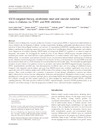Identificador persistente para citar o vincular este elemento:
https://accedacris.ulpgc.es/jspui/handle/10553/75275
| Título: | SOCS1-targeted therapy ameliorates renal and vascular oxidative stress in diabetes via STAT1 and PI3K inhibition | Autores/as: | López-Sanz, Laura Bernal, Susana Recio Cruz, Carlota Pilar Lazaro, Iolanda Oguiza, Ainhoa Melgar, Ana Jimenez-Castilla, Luna Egido, Jesus Gómez-Guerrero, Carmen |
Clasificación UNESCO: | 320502 Endocrinología | Palabras clave: | Diabetes complications Stress signalling |
Fecha de publicación: | 2018 | Proyectos: | SAF2012-38830 SAF2015-63696-R PI14/00386 PIE13/00051 |
Publicación seriada: | Laboratory Investigation | Resumen: | Oxidative stress resulting from excessive production of reactive oxygen species (ROS) or impaired antioxidant defenses is closely related to the development of diabetic vascular complications, including nephropathy and atherosclerosis. Chronic activation of Janus kinase/Signal transducer and activator of transcription (JAK/STAT) signaling pathway contributes to diabetic complications by inducing expression of genes involved in cell proliferation, fibrosis, inflammation, and oxidative stress. Suppressors of cytokine signaling (SOCS) family of endogenous JAK/STAT regulators is an attractive target for therapeutic intervention. We investigated the beneficial effect of two different SOCS1-targeted therapies (adenovirusmediated gene transfer and kinase-inhibitory region peptidomimetic) to combat oxidative stress injury in an experimental diabetes model of concomitant renal and macrovascular disease (streptozotocin-induced diabetic apolipoprotein E-deficient mouse). Diabetes resulted in progressive alteration of redox balance in mice, as demonstrated by increased ROS levels and decreased antioxidant activity, which ultimately led to renal dysfunction and vascular injury. The molecular and pathological alterations in early diabetes were partially reversed by preventive intervention with SOCS1-targeted therapies. Importantly, SOCS1 peptidomimetic provided reno- and atheroprotection in diabetic mice even in a setting of established disease. Compared with untreated controls, kidney and aorta from SOCS1-treated mice exhibited significantly lower levels of superoxide anion, DNA oxidation marker and NADPH oxidase (Nox) subunits, along with higher expression of antioxidant enzymes. These trends correlated with a reduction in parameters of renal damage (albuminuria, creatinine and tubular injury), atherosclerosis (lesion size) and inflammation (leukocytes and chemokines). Mechanistic studies in renal, vascular and phagocytic cells exposed to cytokines and high-glucose showed that SOCS1 blocked ROS generation by inhibiting both Nox complex assembly and Nox subunit expression, an effect mediated by inactivation of JAK2, STAT1, and PI3K signaling pathways. This study provides evidence for SOCS1-targeted therapies, especially SOCS1 peptidomimetic, as an alternative antioxidant strategy to limit the progression of diabetic micro- and macrovascular complications. | URI: | https://accedacris.ulpgc.es/handle/10553/75275 | ISSN: | 0023-6837 | DOI: | 10.1038/s41374-018-0043-6 | Fuente: | Laboratory Investigation [ISSN 0023-6837], n. 98, p. 1276-1290 |
| Colección: | Artículos |
Citas de WEB OF SCIENCETM
Citations
47
actualizado el 08-feb-2026
Visitas
49
actualizado el 10-ene-2026
Descargas
87
actualizado el 10-ene-2026
Google ScholarTM
Verifica
Altmetric
Comparte
Exporta metadatos
Los elementos en ULPGC accedaCRIS están protegidos por derechos de autor con todos los derechos reservados, a menos que se indique lo contrario.
